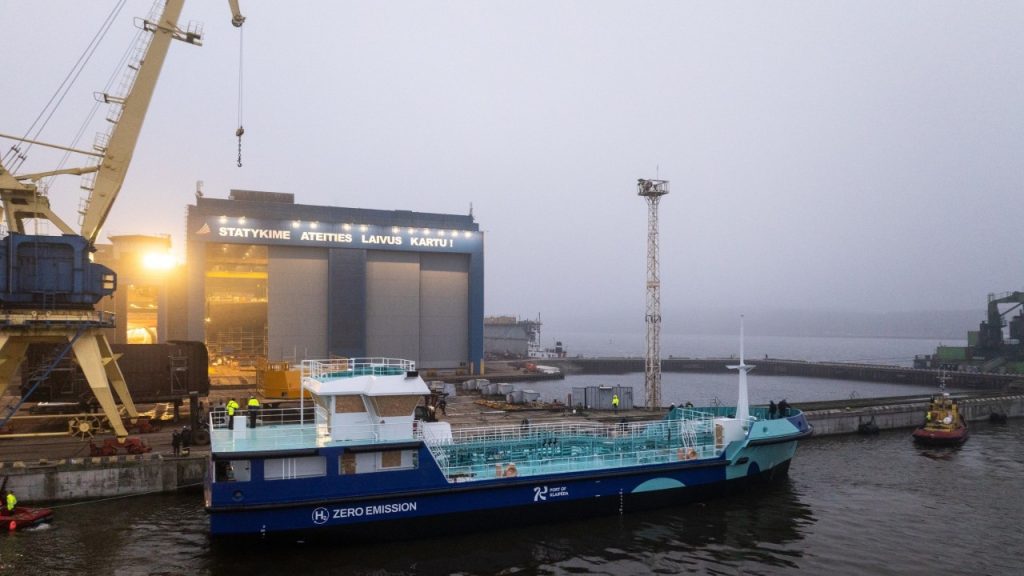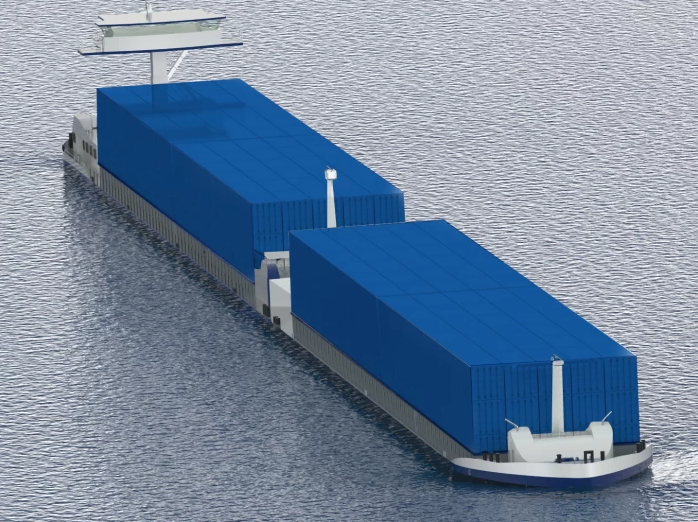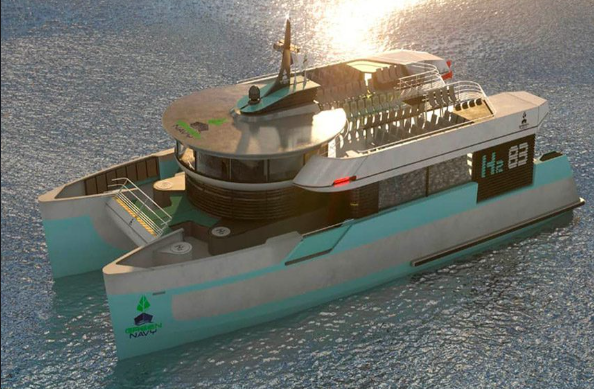Over the past month, I have discovered several hydrogen-powered shipbuilding projects that highlight the growing adoption of this sustainable fuel in the maritime industry. These projects span diverse vessel types, from research ships to inland barges and innovative catamarans. From now on I will follow these projects and keep you informed about them. Below is a summary of these four notable developments.
Lithuania’s First Hydrogen-Powered Ship
Lithuania has launched its first hydrogen-powered vessel, a pioneering step for the Baltic region. Developed by KN Energies in partnership with Port of Klaipėda, this vessel is designed for port operations and logistical support. The ship is equipped with a hybrid propulsion system, combining hydrogen fuel cells with battery storage to optimize efficiency. This marks a significant milestone for Lithuania’s decarbonization efforts in the maritime sector, demonstrating a shift toward cleaner port activities.

Beyond its environmental benefits, the vessel’s design focuses on operational flexibility. The hybrid system allows it to adapt to varying power demands while reducing greenhouse gas emissions. By incorporating hydrogen, the port aims to set an example for future projects, aligning with the European Union’s broader clean energy initiatives. This development reinforces the role of hydrogen in coastal and port applications, paving the way for further regional investments in green maritime technologies.
Hydrogen-Hybrid Coastal Research Vessel
The Scripps Institution of Oceanography has initiated the shipyard selection process for a groundbreaking hydrogen-hybrid Coastal Class research vessel. This ship, part of a broader initiative to decarbonize oceanographic research, will be equipped with hydrogen fuel cells supplemented by battery storage, ensuring near-zero emissions during operations. The vessel’s design focuses on silent, low-impact propulsion, which is crucial for scientific studies that require minimal interference with marine ecosystems.

A key advantage of this hydrogen-hybrid configuration is its extended operational range, allowing researchers to conduct long-duration missions without relying on fossil fuels. By pioneering hydrogen adoption in research fleets, Scripps sets a precedent for academia and government agencies looking to transition to sustainable marine technologies. This project represents a major step toward reducing the environmental footprint of scientific exploration at sea.
Rhenus Hydrogen-Powered Coupled Barges
Logistics giant Rhenus is making a bold move with the introduction of 70 cleaner coupled barges, incorporating hydrogen-based propulsion. These vessels will serve European inland waterways, significantly cutting emissions in a sector that has long relied on diesel engines. With hydrogen fuel cells providing the primary energy source, these barges represent a major leap forward for sustainable inland shipping, a critical component of Europe’s transport network.

By replacing conventional engines with hydrogen-powered systems, Rhenus aims to align with EU regulations targeting emissions reductions in inland waterways. The project underscores the potential for hydrogen in large-scale commercial applications, proving that clean energy solutions can be economically viable. If successful, this fleet could set a precedent for similar initiatives across Europe, transforming inland shipping into a low-emission alternative.
Prometeo: Europe’s First Hydrogen-Electric Catamaran
French company Green Navy has introduced Prometeo, the first hydrogen-electric catamaran in Europe. Designed for passenger transport and leisure applications, this vessel operates entirely on hydrogen fuel cells, producing zero emissions. The catamaran’s design emphasizes efficiency, with lightweight materials and streamlined hulls to maximize performance. As a result, it offers a practical alternative to diesel-powered vessels in coastal and inland waters.

Prometeo showcases the potential for hydrogen-electric propulsion in the leisure and transport sectors, where sustainability is becoming an increasing priority. The vessel’s development highlights France’s commitment to green maritime technology, potentially inspiring other shipbuilders to follow suit. As hydrogen infrastructure continues to expand, vessels like Prometeo may become more commonplace, helping to decarbonize the wider maritime industry.
Four more exciting project to follow
These four projects demonstrate the accelerating pace of hydrogen adoption in maritime applications. From inland barges to oceanographic research vessels, hydrogen is proving to be a viable alternative to fossil fuels, driving innovation across multiple segments of the industry. As more shipbuilders and operators commit to hydrogen, the path to a cleaner maritime future is becoming increasingly clear.
Leave a Reply